The Pandemic, Part II
Continuing to work through COVID-19 pandemic constraints and disruptions, the Nieman Foundation in 2021 addressed the impact critical social, political and public health issues on journalists and journalism.
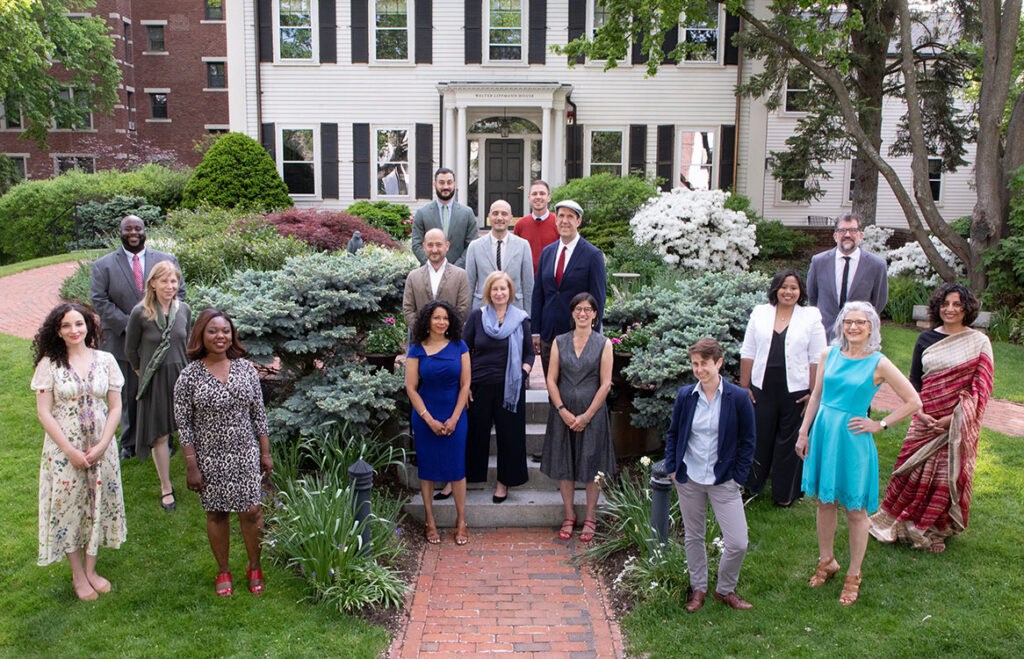
We remained committed to supporting our fellowships and despite being restricted to remote learning and programming, the class of 2021 formed a tightknit community of journalists who, like their Nieman predecessors, collaborated on projects, hosted guest speakers and taught hands-on newsroom skills. They helped us redefine fellowship during the historic 2020-2021 academic year at Harvard that kept students, staff and faculty working and studying remotely.
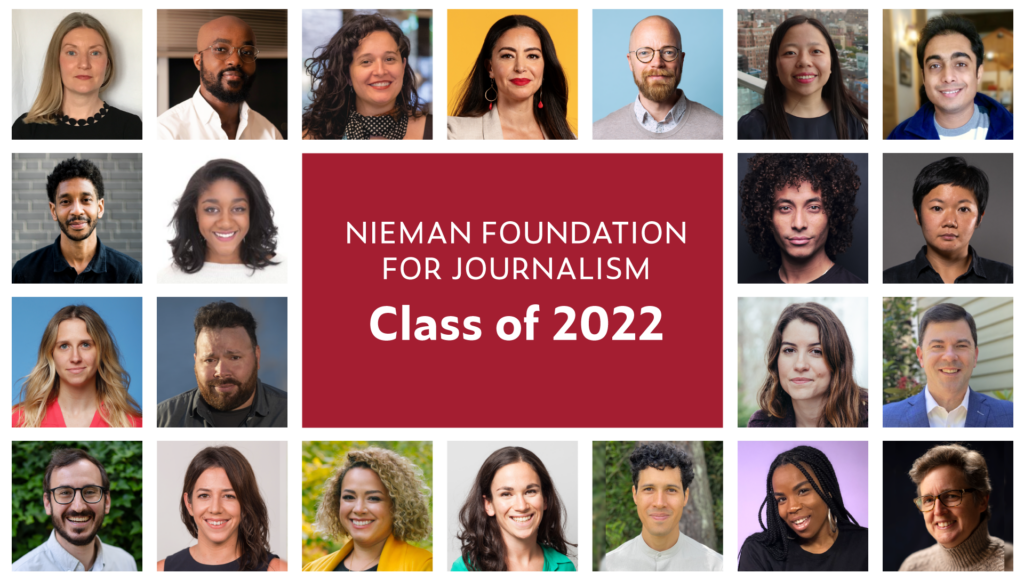
Once COVID-19 vaccines became widely available, Harvard made the decision to reopen for the fall semester. With strict protocols in place to protect the university community, students, staff and our 2022 Nieman Fellows returned to campus to learn and to work together in person.
In Nieman Lab, Nieman Reports and Nieman Storyboard, we reported on new and better ways to diversify news and newsrooms, cover growing political polarization and social strife, expose the mis- and disinformation that distorts public perceptions of truth and reality, showcase newsroom innovations and explore new forms of storytelling.
Our 12 visiting fellows tapped into the resources of Harvard to work on innovative projects that address issues of racial injustice, underrepresented communities and health care disparities.
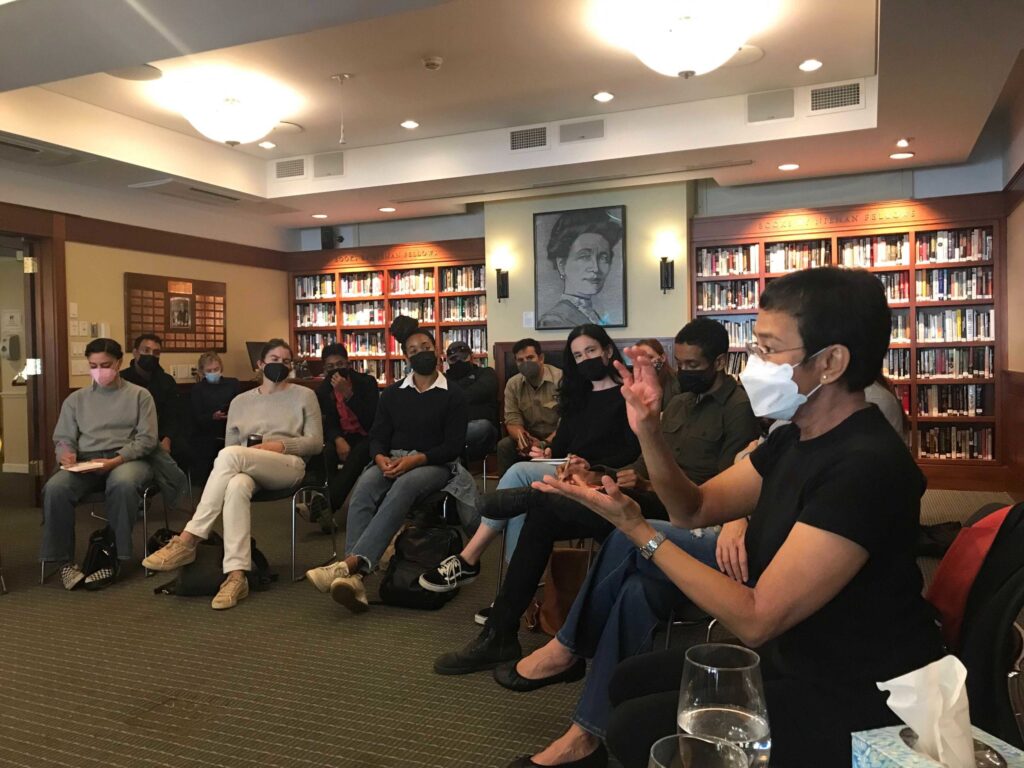
In October, Maria Ressa, CEO and president of Rappler, and Novaya Gazeta’ editor-in-chief Dmitry Muratov won the Nobel Peace Prize. The award citation noted they were chosen not only “for their courageous fight for freedom of expression in the Philippines and Russia,” but as “representatives of all journalists who stand up for this ideal in a world in which democracy and freedom of the press face increasingly adverse conditions.”
A month later, the Nieman Fellows welcomed Ressa, a Shorenstein Center Fellow and Hauser Leader at the Center for Public Leadership at Harvard Kennedy School — to Lippmann House for a heartfelt discussion about the state of journalism today. She talked about the significance of the Nobel win for all journalists, her ongoing work to protect journalism and democracy in the Philippines and globally and her tireless efforts to combat the social media algorithms that allow disinformation, toxic trolls and authoritarian governments to flourish. She also spoke about the special challenges faced by journalists in the Global South, international efforts to enact policies that protect journalists and the need to gauge danger on the job.
Nieman-to-Nieman Talks
Our Nieman-to-Nieman conversation series continued for a second year, gathering the Nieman alumni community together to explore pressing issues with leading voices.
In January, Evan Osnos, a New Yorker writer and author, discussed the current mindsets of the political press corps in D.C., covering Trump and the far-right moving forward, what he learned writing his biography “Joe Biden: The Life, the Run, and What Matters Now” and the challenges ahead for the new president.
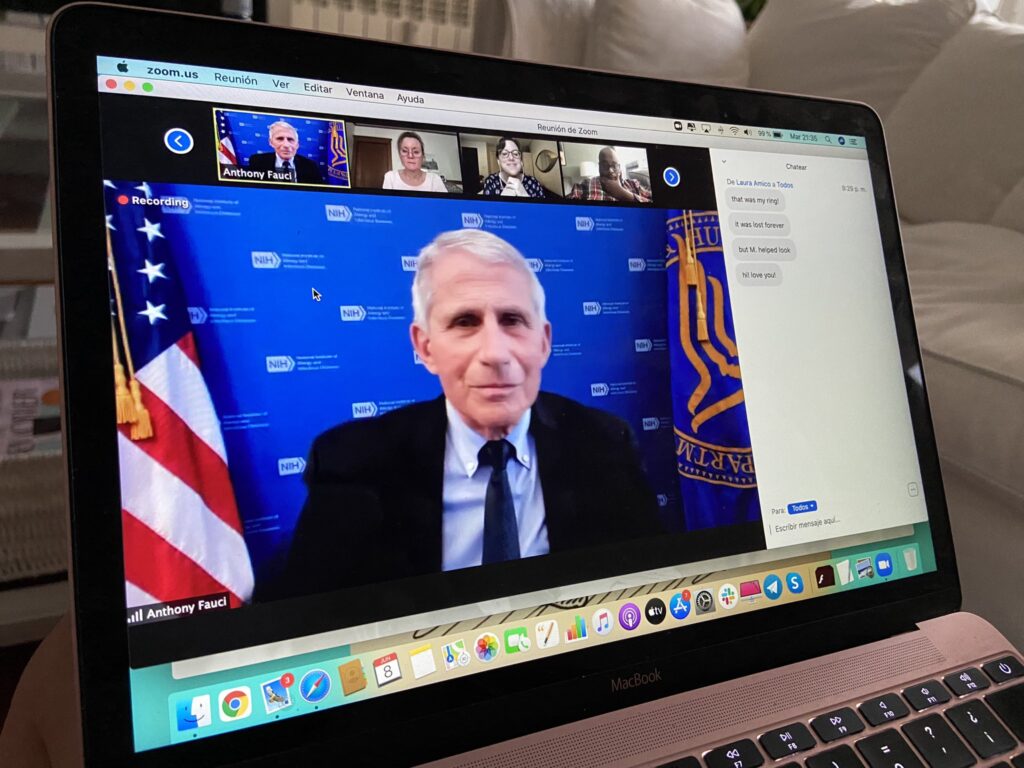
Dr. Anthony Fauci, director of the U.S. National Institute of Allergy and Infectious Diseases (NIAID) and the chief medical advisor to President Joe Biden, joined moderator Jeneen Interlandi, NF ’13, a member of the New York Times editorial board and a staff writer at The New York Times Magazine, for a conversation about lessons learned from the COVID-19 pandemic. Dr. Fauci spoke about attempts to manage the pandemic, his relationship with the Trump administration, combating misinformation, his experiences investigating HIV/AIDS and other topics.
Charlie Warzel, a New York Times Opinion writer-at-large who covers the intersection of media, politics, and technology, joined 2021 Nieman Fellow Joseph Bernstein, a senior technology reporter for BuzzFeed News, to explore the power and future of Big Tech. They discussed the attention economy, coverage of QAnon, privacy issues and more.
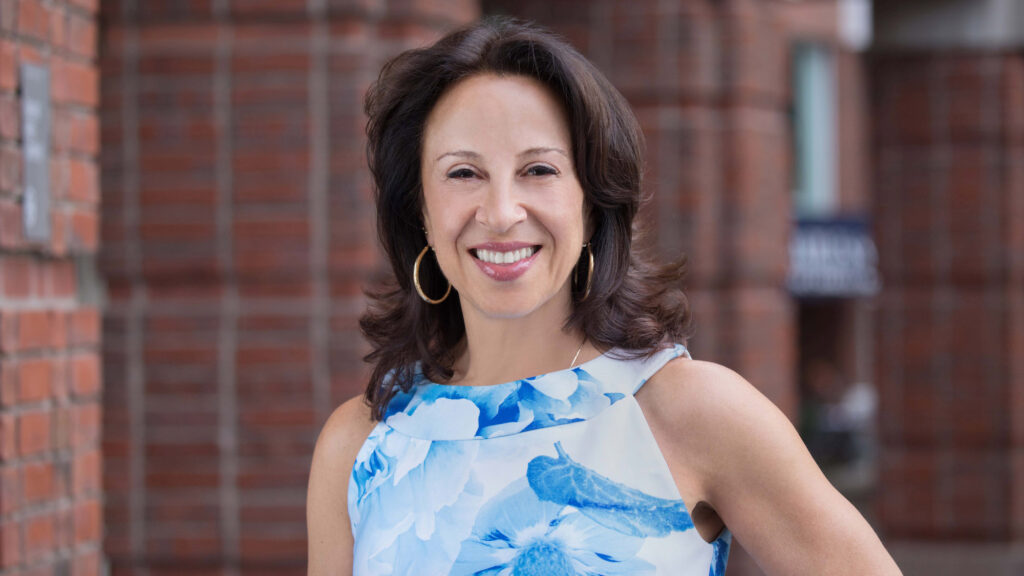
Maria Hinojosa, founder of The Futuro Media Group, anchor and managing editor of NPR’s of “Latino USA” and winner of the 2020 I.F. Stone Medal for Journalistic Independence spoke with 2021 visiting fellow S. Mitra Kalita, founder and publisher of Epicenter and co-founder of URL Media, about increasing diversity in newsrooms and news coverage.
Jason Rezaian, NF ’17, a global opinions writer for The Washington Post and audio journalist Alison MacAdam, NF ’14, joined moderator Carrie Johnson, NF ’20, for a preview of their “544 Days” podcast, based on Jason’s book “Prisoner: My 544 Days in an Iranian Prison.” The series tells the story of Jason’s time inside Tehran’s notorious Evin Prison and the global events that unfolded around his detention, including the high-stakes world of nuclear diplomacy that was used to win his freedom.
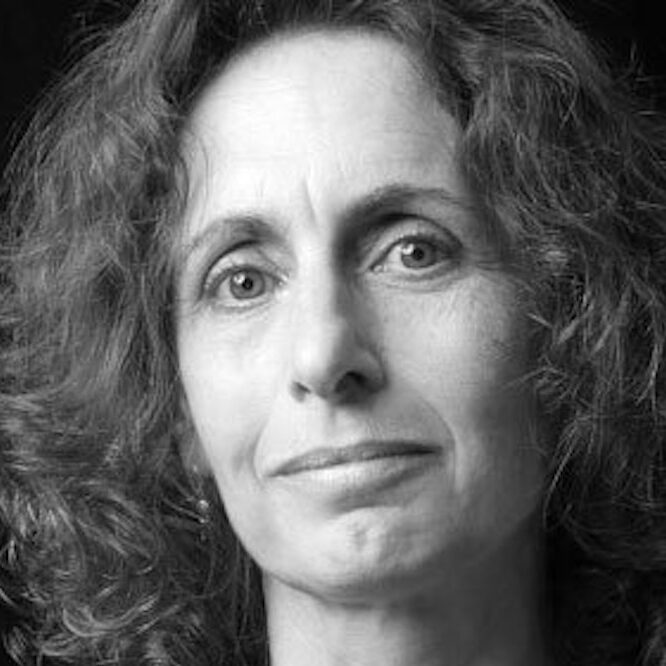
Elizabeth Kolbert, a science journalist, author and staff writer at The New Yorker, shared insights about the challenges of covering climate change in conversation with 2021 Nieman Fellow Scott Dance, an environment reporter for The Baltimore Sun. She discussed environmental justice, geoengineering, genetically modified coral and more. Her books include “Under a White Sky: The Nature of the Future” and the Pulitzer-winning “The Sixth Extinction: An Unnatural History.”
Abdul Wahid Wafa, a 2011 Nieman Fellow, spoke about the help he and other imperiled Afghan journalists received as they tried to board flights out of the country after the Taliban takeover in August. With behind-the-scenes support from his Nieman classmates and the help of The New York Times, including international correspondent and senior writer Alissa J. Rubin, NF ’21, and Mexican officials, Wafa and more than 100 others were able to flee, eventually flying to Houston, Texas. Rubin joined Wafa for the talk, which was moderated by Michael Petrou, NF ’18, editor-in-chief of Open Canada, who has reported from Afghanistan.
Community and Collaboration

In April, student journalist from 29 schools participated in our first virtual Christopher J. Georges Conference on College Journalism, featuring a more geographically diverse group than ever before and a keynote address by CNN senior political correspondent and anchor Abby Phillip, who spoke with Harvard Crimson president Amanda Su. Our 2021 fellows led breakout sessions on topics ranging from beat and international reporting to creating podcasts, writing opinion pieces and diversifying newsrooms. The highlight for many was hearing students discuss the ambitious projects they’ve undertaken on their campuses, including a series on local gun violence, the start of a multilingual magazine and the creation of a news service for the student newsrooms in the Cal State system. Taylor Blatchford, a news producer for The Seattle Times who writes The Lead, a newsletter for student journalists, provided an overview of the state of school-based journalism today.
In partnership with the Credibility Coalition and Hacks and Hackers, which received a grant from the Google News Initiative, Nieman convened a working group of local journalists, including Nieman alumni, for a series of talks to outline ways journalists can better understand — and help platforms to better execute — the discovery and ranking of quality local journalism on digital news delivery platforms. The resulting report, Bridging the Divide Between Local News and Online Platforms, was released in July.
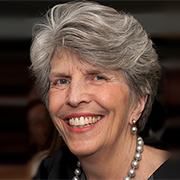
Also in July, we mourned the passing of Nancy Giles, wife of retired Nieman curator Bob Giles, who made a deep and lasting impression on a decade of Nieman Fellows, affiliates and staffers with her generosity, hospitality and kindness. In September, fellows and staff around the world celebrated her life in a Zoom gathering, remembering her many contributions to the program and their own lives and Nancy’s work as a gifted psychologist.
We remember, too, other members of our Nieman family we lost this year:
More than 100 Nieman alumni, signed a petition spearheaded by Beena Sarwar, a 2006 Nieman Fellow, calling on Pakistan to take action against those who are attacking, harassing, and intimidating journalists and to condemn the April assassination attempt on Absar Alam, former chairman of the Pakistan Media Regulatory Authority and a Nieman Fellow from the class of 2005.
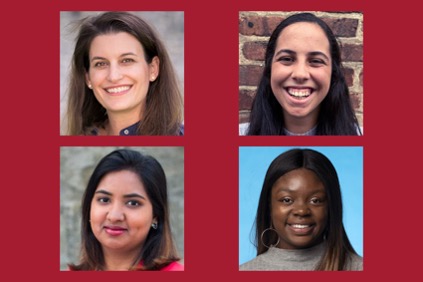
We were pleased to welcome four talented new staff members to Nieman in 2021: At Nieman Reports, Laura Colarusso is the new senior editor and Natalie De Rosa is the assistant editor; Shraddha Chakradhar is Nieman Lab’s deputy editor; and Adriana Lacy is the Nieman Foundation’s new digital and audience engagement editor.
And a never-too-late footnote: This November, more than 86 years after his death, Lucius W. Nieman was inducted into the Wisconsin Newspaper Hall of Fame. The impact of the work Nieman started in his time as publisher and editor of The Milwaukee Journal, and which his wife, Agnes Wahl Nieman — the benefactor of the Nieman Foundation for Journalism at Harvard — later expanded through her priceless gift to Harvard, is immeasurable.
Nieman Publications
Nieman’s three sister publications, Nieman Lab, Nieman Reports and Nieman Storyboard, examined the many ways journalists, newsrooms and media companies had to pivot during the pandemic and reported on the strategies and methods reporters use to cover topics ranging from racial injustice and misinformation to attacks on the press.
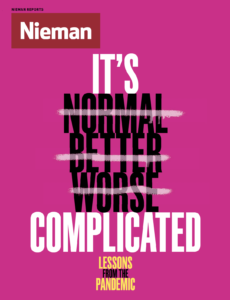
In Nieman Reports’ Winter 2021 issue, reporters looked at journalism in the post-Trump era and the need to restore trust in journalism. In the spring, the focus was on covering the police and examining racist structures and legacies of law enforcement. The Summer/Fall 2021 issue featured Lessons from the Pandemic, a cover package in which writers shared ways that newsrooms might change for the better following months of COVID restrictions and hardships.
Nieman Lab continued to cover digital developments in the media world with special attention given to the importance of diversity in the news industry and changing perceptions of objectivity. Its articles increasingly focused on audiences and how they process news as well as how increasingly partisan, polarized rhetoric is affecting news consumption. The Lab additionally has helped distill important research for its readers. It ended the year with its annual look ahead with Predictions for Journalism 2022 along with a pledge to increase coverage of health reporting and climate issues in the new year.
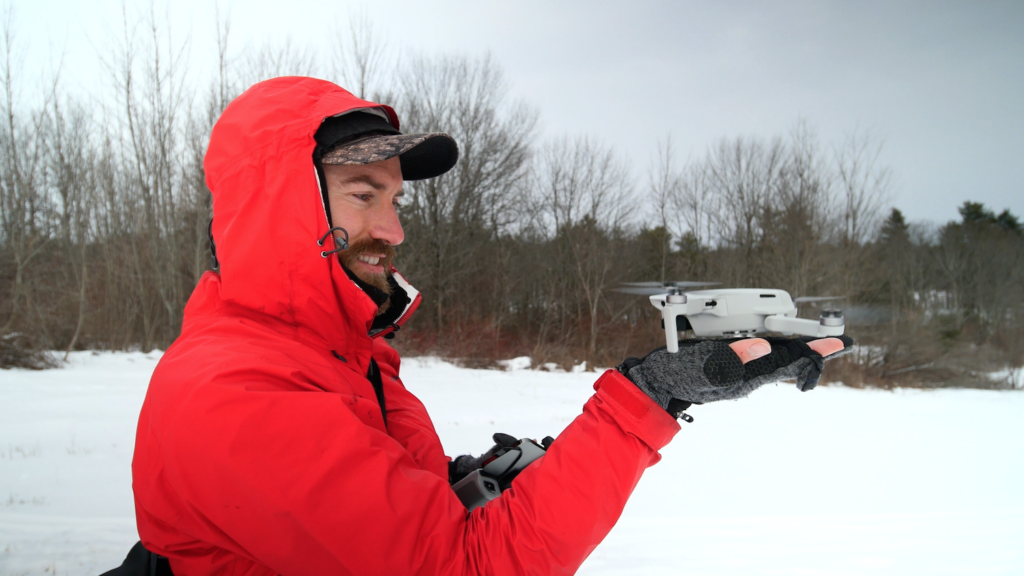
Nieman Storyboard articles showcase the best work in narrative journalism. In 2021, Storyboard published a two-week series on how to teach and coach the nut graf as well as a series on the 7 Fatal Flaws of Story Pitches and “Field Testing,” a five-part series about solo video storytelling by 2020 Nieman Fellow Alexander Trowbridge. The site also has begun to look at the intersection of investigative and narrative journalism. Through Story Annotations, readers learn about the components that make good stories shine. Personal Essays help journalists learn from the experiences of other writers while Narrative News articles cover developments in the industry and Story Craft posts help journalism educators and students learn the art and craft of nonfiction storytelling.
Learn more about our reporting on our Publications page.
Recognizing Journalistic Excellence
The Nieman Foundation presents annual journalism awards to news organizations and journalists for their work in several categories.
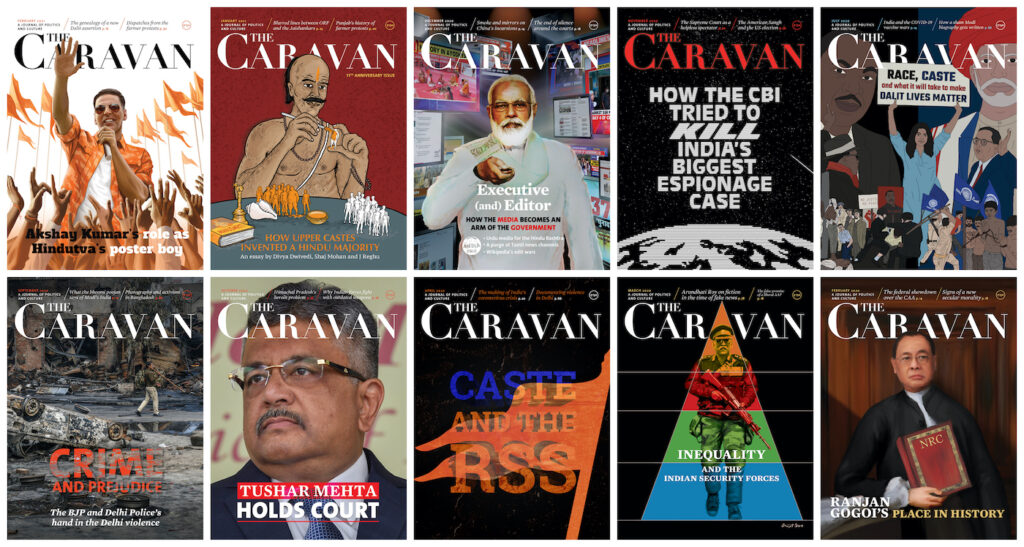
Honorees in 2021 included The Caravan, an Indian politics and culture magazine, winner of the 2021 Louis M. Lyons Award for Conscience and Integrity in Journalism. The Nieman class of 2021 selected The Caravan in recognition of its unique and uncompromising coverage of the erosion of human rights, social justice, and democracy in India. In May, Vinod Jose, executive editor of The Caravan and political editor Hartosh Singh Bal spoke to the class about the state of politics and the free press in India, violence against Muslims and other minorities, the COVID-19 crisis, their experiences holding power to account and keeping their employees safe from threats.
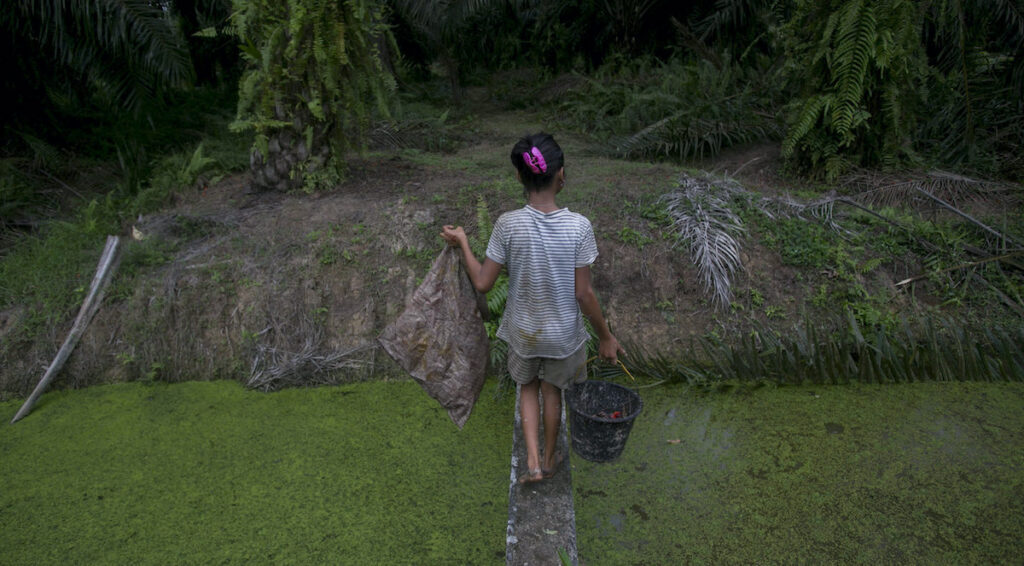
The Associated Press won the 2020 Worth Bingham Prize for Investigative Journalism for “Fruits of Labor,” an exhaustive two-year investigation by Associated Press reporters Margie Mason, a 2009 Nieman Fellow, and Robin McDowell into widespread abuses in the palm oil industry and the dangerous conditions laborers face on large palm oil plantations in Indonesia and Malaysia. The reporting has led to vital reforms and import bans.
The Tampa Bay Times won the 2020 Taylor Family Award for Fairness in Journalism for “Targeted,” an investigation by reporters Kathleen McGrory and Neil Bedi into a data-driven police program that for years monitored, intimidated and harassed families in Pasco County Florida. Finalists were ProPublica for “Grace: A Failure in Michigan’s Juvenile Justice System,” which investigated the case of a 15-year-old Black girl who was jailed for not doing her schoolwork and the deeply flawed juvenile justice system that allowed her detention, and USA TODAY for its “Torn Apart” series, which showed how the state of Florida used a child protection law to take children from families, often without sufficient cause, and put them directly in harm’s way in a poorly monitored foster care system.
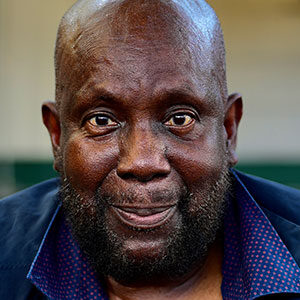
Photojournalist Eli Reed, a 1983 Nieman Fellow, won the 2021 I.F. Stone Medal for Journalistic Independence. For half a century, his photography has captured the face of racism in the U.S. and documented human suffering in conflicts around the world, from Beirut and Central America to Africa and beyond.
Recipients of the 2021 Lukas Prize Project Awards, which honor exceptional nonfiction books, were Jessica Goudeau, winner of the J. Anthony Lukas Book Prize for “After the Last Border: Two Families and the Story of Refuge in America, William G. Thomas III, winner of the Mark Lynton History Prize for “A Question of Freedom: The Families Who Challenged Slavery from the Nation’s Founding to the Civil War,” and the two J. Anthony Lukas Work-in-Progress Award winners, Emily Dufton for “Addiction Inc.: How the Corporate Takeover of America’s Treatment Industry Created a Profitable Epidemic” and Casey Parks for “Diary of a Misfit.”
Barton Gellman was the Lukas Book Prize finalist for “Dark Mirror: Edward Snowden and the American Surveillance State” and Martha S. Jones was the Lynton History Prize finalist is for “Vanguard: How Black Women Broke Barriers, Won the Vote, and Insisted on Equality for All.”
Nieman Programming
Each year, we invite a broad range of speakers to participate in Nieman seminars, shop talks and workshops as well as informal chats organized by the Nieman Fellows. They share their research, insights and suggestions on a variety of topics.
Seminars and Shop Talks
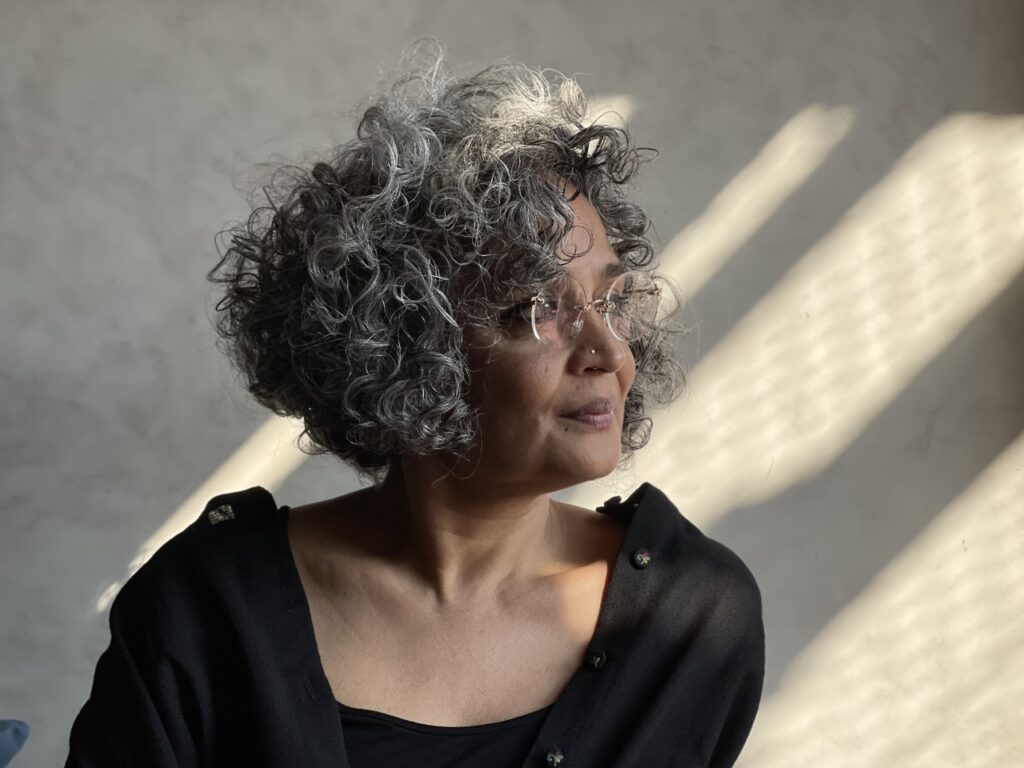
Arundhati Roy joined 2021 Nieman Fellow Vidya Krishnan for a discussion about the erosion of democratic norms worldwide, the forces that threaten the free press in their country, writing in the age of disinformation and ongoing gender and caste violence.
Brian McGrory, editor-in-chief, The Boston Globe, joined fellows to discuss the Globe’s new Fresh Start initiative.
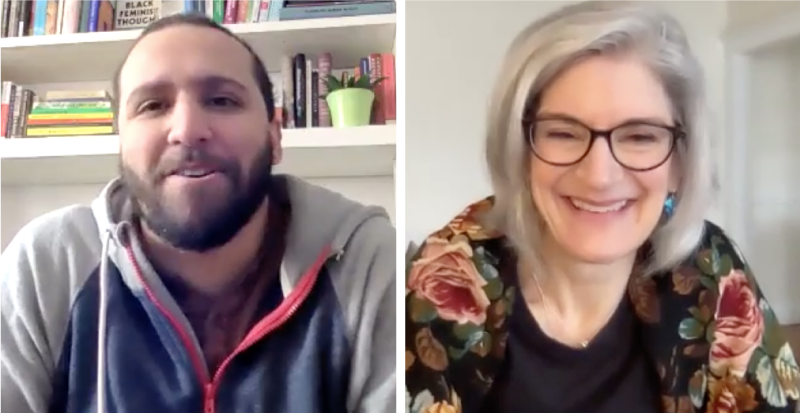
Wesley Lowery, a “60 Minutes” correspondent and contributing editor at The Marshall Project, spoke with former Washington Post colleague Sarah Kaufman and other 2021 Nieman Fellows about the challenges of criminal justice reporting, racial justice, policing and victims of color.
Jill Lepore, Kemper Professor of American History at Harvard, author and a New Yorker staff writer, spoke about her take on the nature and future of work and other projects.
Emily Bell, the founding director of Columbia’s Tow Center for Digital Journalism, spoke with Nieman Lab editor Laura Hazard Owen and Nieman Fellows about rethinking how journalists report on truth and misinformation.
Yochai Benkler, Berkman Professor of Entrepreneurial Legal Studies at Harvard Law School and faculty co-director of the Berkman Klein Center for Internet and Society discussed his work with 2021 Nieman Fellow Emily Corwin, an investigative reporter and editor for Vermont Public Radio.
Ethan Zuckerman, an associate professor of public policy, information and communication at the University of Massachusetts Amherst and director of the Initiative for Digital Public Infrastructure spoke with the classes of 2021 and 2022 about his research and how to reimagine the internet.
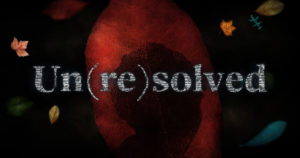
PBS Frontline’s executive producer Raney Aronson-Rath and director of digital video Carla Borras provided a sneak peek of “Un(re)solved,” their new multimedia project that explores cold cases from the civil rights era.
Evelynn Hammonds, the Barbara Gutmann Rosenkrantz Professor of the History of Science and of African and African American Studies at Harvard, spoke with 2021 Nieman Robert Frederick, the digital managing editor of American Scientist, about her new role as chair of a steering committee on human remains in the University’s museum collections.
Pap Ndiaye, a French historian and director of the National Museum of the History of Immigration in Paris, discussed race relations and the political climate in France ahead of the country’s 2022 presidential election with 2021 Nieman Marc-Olivier Bherer, a staff editor and reporter for the Ideas-Debates section of Le Monde.
Matthew Teague, NF ’19, spoke to fellows about lessons learned while adapting his Esquire essay “The Friend: Love Is Not a Big Enough Word,” about the death of his first wife, into a screenplay and the feature film “Our Friend.”
Tyler J. VanderWeele, director of The Human Flourishing Program at Harvard, co-director of the Initiative on Health, Religion and Spirituality and the John L. Loeb and Frances Lehman Loeb Professor of Epidemiology at the Harvard T.H. Chan School of Public Health spoke about research on ways to promote human flourishing.
Harvard President Lawrence Bacow spoke to the 2021 Nieman Fellows in May as part of a series of farewell ceremonies for the class.
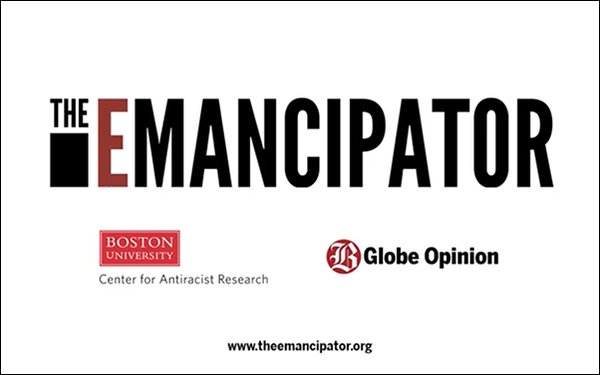
In September, Amber Payne, a 2021 Nieman Fellow, and Deborah D. Douglas, newly named co-editors-in-chief of The Emancipator, discussed their work to reframe the national conversation on racial justice. The Emancipator is a new venture produced jointly by Boston University’s Center for Antiracist Research and The Boston Globe’s Opinion team.
E.J. Dionne, Washington Post Op-Ed columnist and a visiting professor in religion and political culture at Harvard, Divinity School spoke to the 2022 fellows about his take on the political pulse of the nation.
Makeda Best, the Richard L. Menschel curator of photography at the Harvard Art Museums, lead a tour of the “Devour the Land: War and American Landscape Photography since 1970” exhibition.
Arnon Mishkin, director of the Fox News Decision Desk and a fellow at the Institute of Politics at Harvard, discussed polarization in a talk moderated by 2022 Nieman Fellow Jakob Moll, co-founder and former CEO of Zetland.
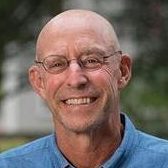
Michael Pollan, author, professor of journalism at the UC Berkeley Graduate School of Journalism and the Lewis K. Chan Arts Lecturer and Professor of the Practice Non-Fiction at Harvard, spoke about the growing field of psychedelics research and the Berkeley Center for the Science of Psychedelics, which he cofounded last year. Nieman Fellow Shereen Marisol Meraji, who will join Pollan at Berkeley as an assistant professor of race in journalism after her Nieman Fellowship, moderated the talk.
Former New York Times executive editor Jill Abramson, now a senior lecturer in Harvard’s English department, spoke with Nieman Fellow Gabrielle Schonder, a producer and reporter for “Frontline” about reporter-manager relationships and prospects for digital news outlets, among other topics.
Trymaine Lee, an MSNBC correspondent and fellow at Harvard’s Institute of Politics, joined Nieman Fellow Felice León, a video producer and presenter at The Root, for a conversation about his “Into America” podcast, which explores the intersection of politics, race and justice through the lens of the Black experience.
Pippa Norris, the Paul McGuire Lecturer in Comparative Politics at Harvard Kennedy School spoke about her forthcoming book “In Praise of Skepticism: Trust But Verify,” which questions prevalent assumptions underpinning modern accounts of trust. 2022 Nieman Fellow Bao Choy, an investigative journalist from Hong Kong, moderated the talk.
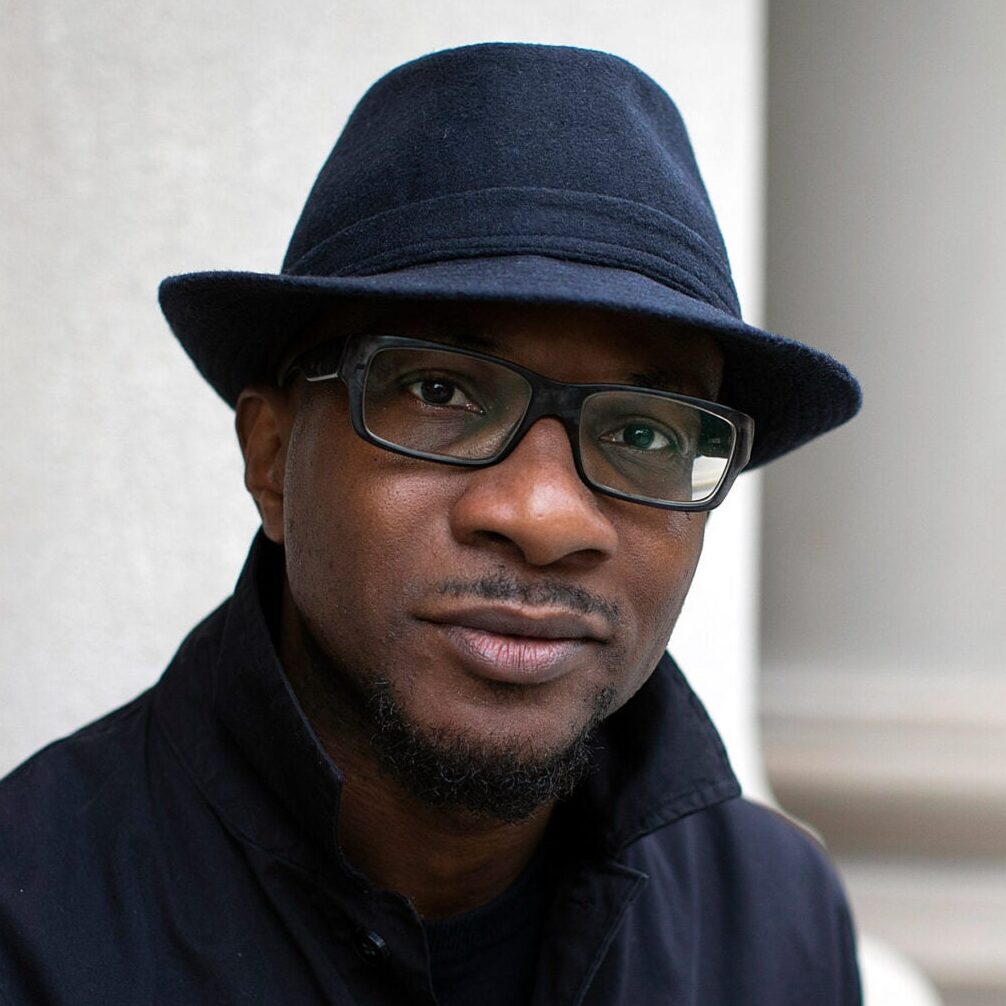
Teju Cole, a novelist, critic, and essayist and photographer/photography critic who teaches writing at Harvard as the first Gore Vidal Professor of the Practice of Creative Writing, spoke with moderator Deb Pastner, a 2022 Nieman Fellow and director of photo and multimedia at the Star Tribune in Minneapolis, about his work.
Steven Levitsky, director of the David Rockefeller Center for Latin American Studies at Harvard, spoke to Nieman Fellows about his research on political systems and protests in Latin America. Natalia Viana, NF ’22, co-founder and executive director of Agência Pública, Brazil’s first nonprofit investigative journalism outlet, moderated the discussion.
Marshall Ganz, the Rita E. Hauser Senior Lecturer in Leadership, Organizing, and Civil Society at Harvard Kennedy School, spoke with fellows in a talk moderated by Sammy Jo Hester, the lead photo editor for sports at the Los Angeles Times.

To round out the fall semester, fellows visited the MIT Media Lab and met with director Dava Newman, Media Lab alum Dr. Daniel Novy and Deb Roy, professor of Media Arts and Sciences at MIT and director of the MIT Center for Constructive Communication They also watched demonstrations by the Lab’s Tangible Media group, which is led by Prof. Hiroshi Ishii, the Conformable Decoders group and City Science group.
Workshops and Trainings
Brian Mandell, senior lecturer in public policy and director of the Harvard Kennedy School Negotiation Project, conducted negotiation workshops for fellows in the classes of 2021 and 2022.
Cody Winchester, IRE’s senior training director, provided an overview of data journalism and social media reporting.
Samantha Appleton, NF ’19, led a two-part introduction to photojournalism workshop.
Jorge Caraballo Cordovez, growth editor for Radio Ambulante, led a session on audience engagement in April. He later returned to Nieman as a 2022 fellow.
Joan Donovan, research director of the Kennedy School’s Shorenstein Center and leader of The Technology and Social Change Project (TaSC), conducted a hands-on workshop for fellows called “Detect, Document, Debunk: Analyzing Media Manipulation and Disinformation Campaigns.”
Nieman DIYs
Nieman Fellows organized a series of “DIYs,” informal talks and on a wide range of topics as well as in-house trainings for their Nieman classmates.
The Class of 2021
Austin Bogues invited Harvard Divinity School Professor Lauren Kerby for a discussion about polarization, religion, politics and her book “Saving History: How White Evangelicals Tour the Nation’s Capital and Redeem a Christian America.”
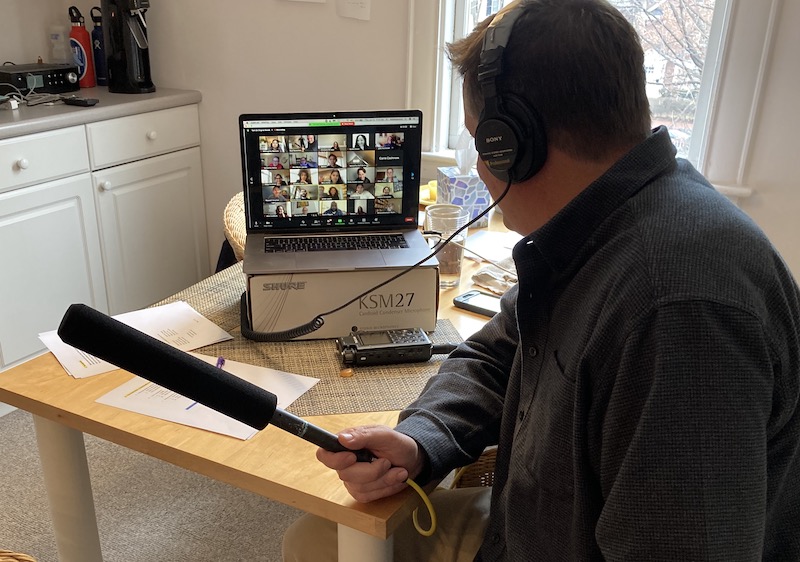
Nieman affiliate Rob Rosenthal, a producer and the lead teacher for the Transom Story Workshop, led a radio reporting training.
Fellows Emily Corwin and Samantha Broun hosted Pooja Rangan, a media studies professor at Amherst College, and Brett Story, a documentary filmmaker, who discussed the harm “true crime” reporting can do, arguing that it reinforces a fundamentally oppressive criminal legal system.
Investigative journalist and author Amanda Ripley, spoke with Emily Corwin about her new book “High Conflict: Why We Get Trapped and How We Get Out.”
Documentary filmmaker Stanley Nelson spoke with 2021 Nieman Fellow Amber Payne about his work and new film “Tulsa Burning: The 1929 Race Massacre.”
Harvard Divinity School professor Catherine Brekus joined Nieman Fellow Alissa Rubin for a conversation about the history of white nationalism in the U.S.
The Class of 2022
Fellows Jakob Moll, co-founder and former CEO of Zetland, a membership-based digital newspaper in Denmark, Jorge Caraballo Cordovez, the growth editor at “Radio Ambulante,” NPR’s only podcast in Spanish, and Jonathan Rabb, founder of Watch The Yard, shared their expertise on audience engagement strategies.
Several 2022 fellows discussed how they launched media startups: Bao Choy spoke about her work building an investigative journalism organization in Hong Kong; Natalia Viana discussed how she co-founded Agência Pública, Brazil’s first nonprofit investigative journalism outlet; and Jonathan Rabb explained how he built Watch the Yard, a digital platform for Black college students and alumni, to tell authentic stories about, with and for the Black community.
Reuben Fischer-Baum, an editor who leads a team of graphics reporters at The Washington Post, and Caelainn Barr, data projects editor at The Guardian in London, led a session on ways newsrooms and journalists can use data and graphics in reporting.
Terry Tempest Williams, an environmental author, educator and a writer-in-residence at Harvard Divinity School, visited for a conversation organized by 2022 Nieman affiliate Laura Restrepo about effective ways to communicate the influence of climate change in our lives.
